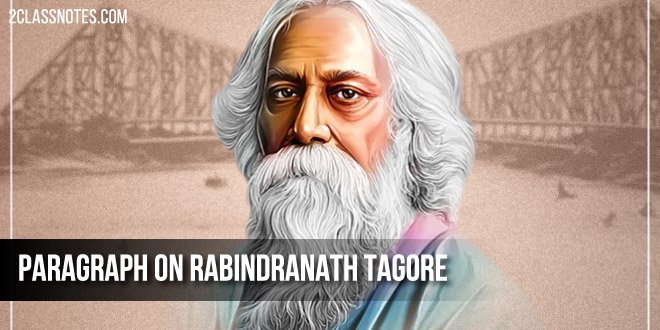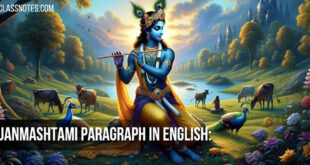Paragraph on Rabindranath Tagore: Rabindranath Tagore, often affectionately referred to as “Gurudev,” was a literary luminary, philosopher, and creative genius who graced the 20th century with his profound contributions. Born in 1861 in Bengal, India, Tagore’s legacy transcends borders and time, making him an enduring figure in the world of literature and art. His works, including the iconic “Gitanjali” and the revered national anthem of India, “Jana Gana Mana,” resonate with simplicity and depth, touching the hearts of countless readers. Beyond his literary prowess, Tagore’s vision extended to education and the promotion of universal humanity. In this blog, we will provide a few sample paragraphs on the literary genius of Rabindranath Tagore, that will take you through a brief exploration into the life of this man whose words continue to inspire and unite people worldwide.
Long and Short Paragraph on Rabindranath Tagore:
Whether you are looking for a short Rabindranath Tagore Paragraph of 100 words or a long one of 250 words, we have you covered. Here we have provided paragraphs of varying lengths on Rabindranath Tagore for your effective preparation.
Short Rabindranath Tagore Paragraph in 100 Words:
Rabindranath Tagore, born in 1861, remains an iconic figure in world literature. His literary masterpiece, “Gitanjali” (Song Offerings), brought him the Nobel Prize in Literature in 1913. Tagore’s verses explore the profound themes of love, nature, and spirituality. His poems, often set to music, resonate with readers across generations. He penned not only poetry but also essays, stories, and plays. Beyond his literary achievements, Tagore was a painter, musician, and educator. Tagore’s legacy extends to his role in India’s struggle for independence, and his compositions, “Jana Gana Mana” and “Amar Shonar Bangla,” became the national anthems of India and Bangladesh, respectively. His thoughts on education led to the establishment of Visva-Bharati University. Even today, Rabindranath Tagore’s words continue to inspire and influence people worldwide.
Short Paragraph in 150 Words:
Rabindranath Tagore, born in 1861, was an eminent poet, philosopher, and polymath from India. His literary genius earned him the Nobel Prize in Literature in 1913 for his collection of poems titled “Gitanjali” (Song Offerings). Tagore’s poetry delved into profound themes of love, nature, and spirituality, resonating deeply with readers across the globe. His works often featured a unique blend of music and verse, making them even more enchanting. Beyond his literary prowess, Tagore was a multifaceted personality. He excelled as a painter, musician, and playwright, contributing significantly to the world of art and culture. One of his most enduring legacies lies in his contributions to the national anthems of two countries. “Jana Gana Mana” became India’s national anthem, while “Amar Shonar Bangla” was adopted as Bangladesh’s national anthem. Tagore’s impact extended to education, and he founded Visva-Bharati University, emphasizing a holistic approach to learning. His philosophy on education continues to inspire educators worldwide. Rabindranath Tagore’s literary and cultural contributions transcend time and borders, leaving an indelible mark on the world.
Paragraph in 200 Words:
Rabindranath Tagore, born in 1861 in Calcutta, India, was a literary giant of the 20th century. His profound and evocative poetry, collected in “Gitanjali” (Song Offerings), earned him the Nobel Prize in Literature in 1913. Tagore’s verses, exploring themes of love, nature, and spirituality, have a timeless quality that continues to enchant readers. Tagore’s creativity was not confined to poetry; he was also a prolific playwright, novelist, essayist, and musician. His artistic talents extended to painting, where he expressed his thoughts and emotions on canvas. One of Tagore’s most significant contributions lies in his role as a composer of anthems. “Jana Gana Mana” was adopted as India’s national anthem, while “Amar Shonar Bangla” became the national anthem of Bangladesh. These anthems continue to unite and inspire people in both countries. Tagore’s vision extended beyond art and literature; he was a visionary educator. He founded Visva-Bharati University, emphasizing a holistic approach to learning that embraced the arts, culture, and spirituality. His educational philosophy remains influential and is a testament to his commitment to nurturing well-rounded individuals. In conclusion, Rabindranath Tagore’s legacy is vast and enduring. His literary brilliance, artistic talents, and contributions to national anthems and education make him a true luminary. Even today, Tagore’s words and ideas continue to inspire and resonate with people worldwide, bridging cultures and generations.
Long Paragraph on Rabindranath Tagore in 250 Words:
Rabindranath Tagore, a towering figure in the world of literature and arts, was born in 1861 in Bengal, India. His life’s journey encompassed an extraordinary range of creative achievements, earning him the title “Gurudev” or “the Bard of Bengal.” Tagore’s most celebrated work, “Gitanjali” (Song Offerings), won him the Nobel Prize in Literature in 1913, marking the first time an Asian had received this prestigious honor. This collection of poems is a testament to Tagore’s deep spiritual insight, love for nature, and exploration of human emotions. Tagore’s literary brilliance extended beyond poetry to encompass novels, essays, short stories, and plays. His unique writing style combined simplicity with profound philosophical depth, making his works accessible to readers of all backgrounds and ages. Apart from his literary pursuits, Tagore was a visionary educator who founded the Visva-Bharati University in Shantiniketan, emphasizing the holistic development of students and the nurturing of their creative talents. His educational philosophy was grounded in the belief that education should not be confined by the walls of a classroom but should encourage a deep connection with nature and a harmonious understanding of humanity. Tagore’s influence extended to music and art, where he composed a wealth of songs, including “Rabindra Sangeet,” and created remarkable visual art. His legacy lives on not only through his written words but also through the enduring impact he left on literature, education, and the arts. Rabindranath Tagore’s life and work continue to inspire and remind us of the boundless potential of human creativity and the power of literature to transcend boundaries and touch the soul.
 Class Notes NCERT Solutions for CBSE Students
Class Notes NCERT Solutions for CBSE Students






